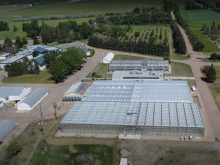Alberta Conservative agriculture minister Doug Horner went to Parliament Hill last week to suggest a marketing monopoly that denies farmers the right to market their own grain is “un-Canadian.”
Manitoba New Democrat agriculture minister Rosann Wowchuk accused Ottawa of being undemocratic because it had been refusing to promise grain farmers a vote over proposals to abolish the Canadian Wheat Board monopoly. She vowed Manitoba will poll its 8,000 affected farmers if Ottawa will not.
And Saskatchewan New Democrat minister Mark Wartman accused federal minister Chuck Strahl of “questionable tactics” and said his province was studying how to react to a unilateral federal move to end the monopoly, including a court challenge.
Read Also

Alberta crop diversification centres receive funding
$5.2 million of provincial funding pumped into crop diversity research centres
It was one of the feistiest sessions in the first week of House of Commons agriculture committee hearings on the wheat board issue as the three provincial ministers gathered on a single panel Oct. 25 to joust with opposing MPs. The session was held before Strahl announced that a farmer plebiscite would be held on changing the CWB monopoly on barley.
The verbal battles were scheduled to continue this week with another three days of hearings including an appearance by Strahl, and a Commons debate.
Horner set the tone for his aggressive remarks in favour of an end to the monopoly with a cheeky question to MPs. He wanted to get “a bit of a feel for the audience I’m speaking to,” Horner told committee members. He asked: How many opposition MPs opposed to an end to the monopoly represent a riding in the wheat board designated area? A Winnipeg New Democrat and a northern Saskatchewan Liberal were there, although not committee members, but no one responded. “OK, so there are none,” said Horner. “I think the record should show that.”
Prince Edward Island Liberal Wayne Easter quickly objected that politicians always are making policies that affect people outside their ridings and that does not diminish their arguments or legitimacy. But Horner had made his point that MPs representing almost all CWB-area farmers support an end to the monopoly. Its presence has led to declining investment in wheat and barley research and in wheat and barley acreage. He dismissed fears that an end to the monopoly would be the end of the wheat board and a sacrifice of producers to big grain companies.
“Cattle, hogs and other products all operate successfully in the global markets,” he scoffed. “Our farmers are not stupid. They know how to be entrepreneurs and they know how to market their grain. They don’t need to be told how to.”
Wartman insisted the board could not compete without grain handling infrastructure and loss of the monopoly would be loss of the board, leading to loss of farmer power and infrastructure. He mocked the Conservative talk of choice as disingenuous.
“I too would like to talk about choice but unlike the federal government, my vision of choice sees western farmers choosing for themselves the best way to market their wheat, durum and barley, options which include the right to market collectively by retaining the board’s single desk authority.”
Wowchuk said the end of the CWB would lead to American trade challenges and the board would not be there to lead the fight.
“If farmers start selling wheat and barley directly into the U.S., we know it won’t be long before there is another trade action launched against us.”
She challenged those who argue the wheat board is an oppressor of farmers.
“You have to realize it is the farmers themselves who are the monopoly,” said Wowchuk. “This monopoly, the Canadian Wheat Board, and farmers are one and the same.”
Later, Manitoba Conservative James Bezan challenged her on why the NDP government had not reinstated the hog single desk removed by a previous Conservative government if single desks are so bad. Farmers hadn’t asked her to, she said.
Critics of the federal government wondered why, if opponents of the monopoly are so certain of farmer support, they are afraid of having a vote. Horner replied that in Alberta, they did have a vote more than a decade ago and 67 percent said they wanted choice. He said the sentiment has not diminished.














